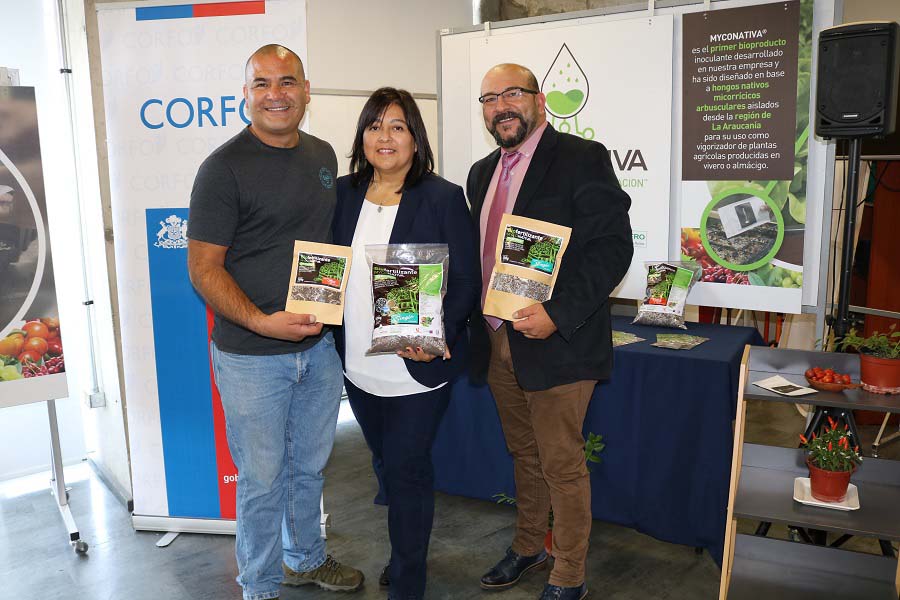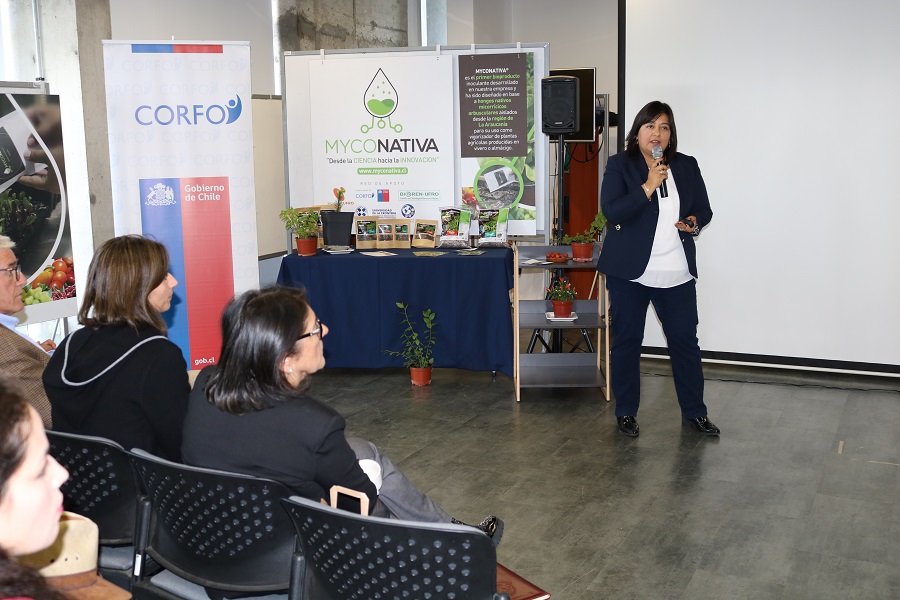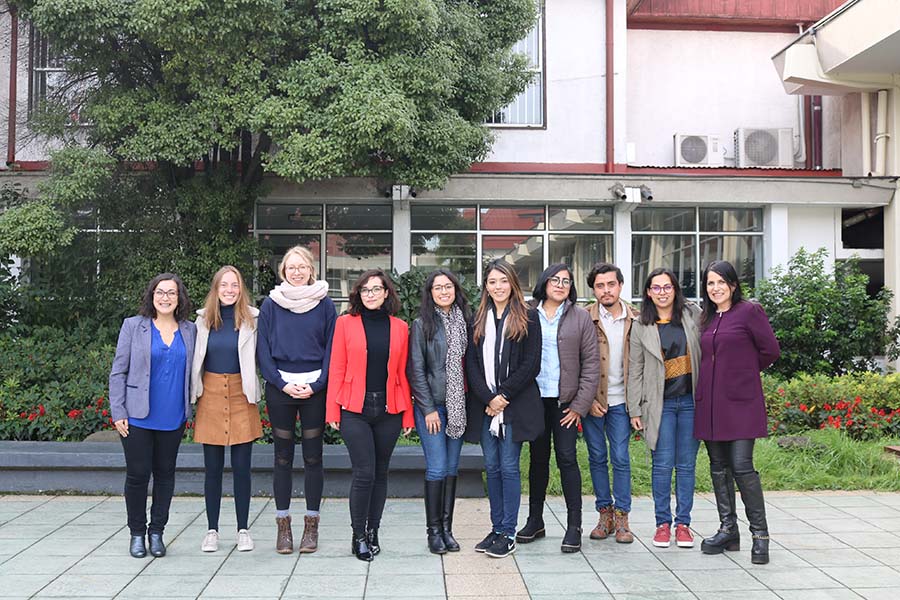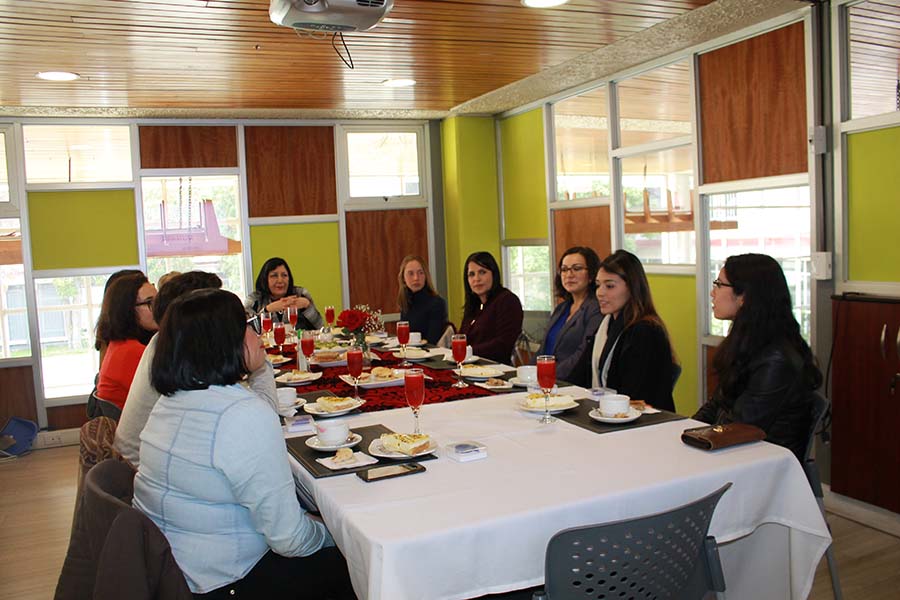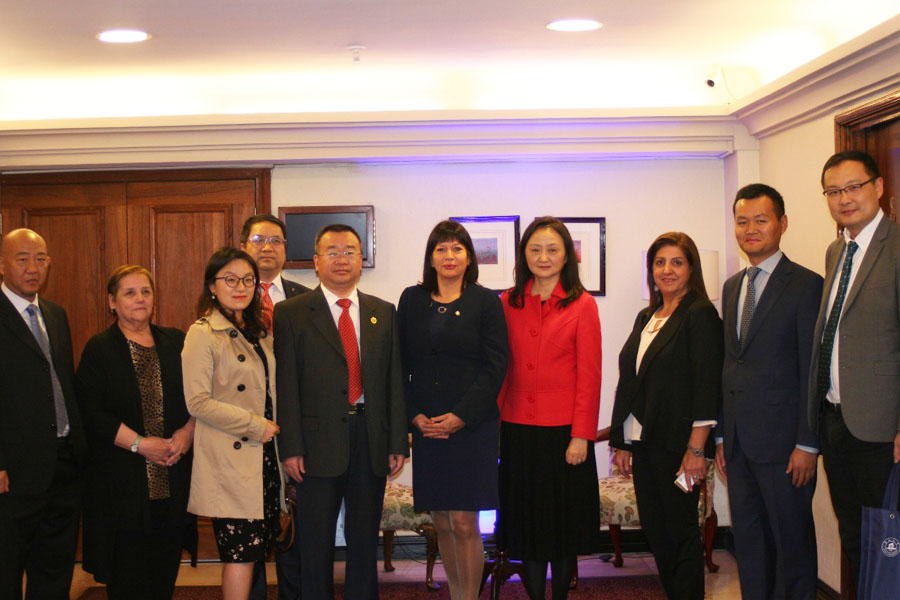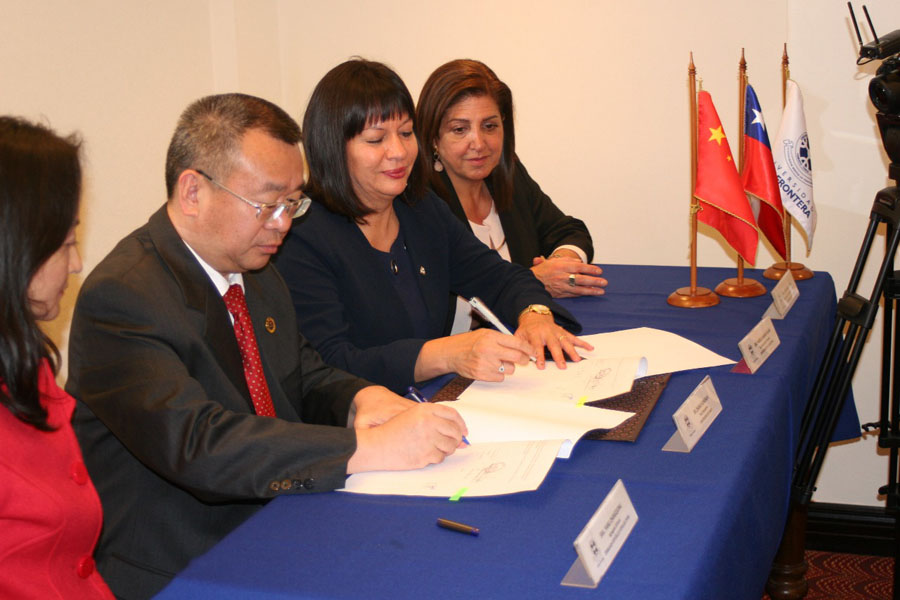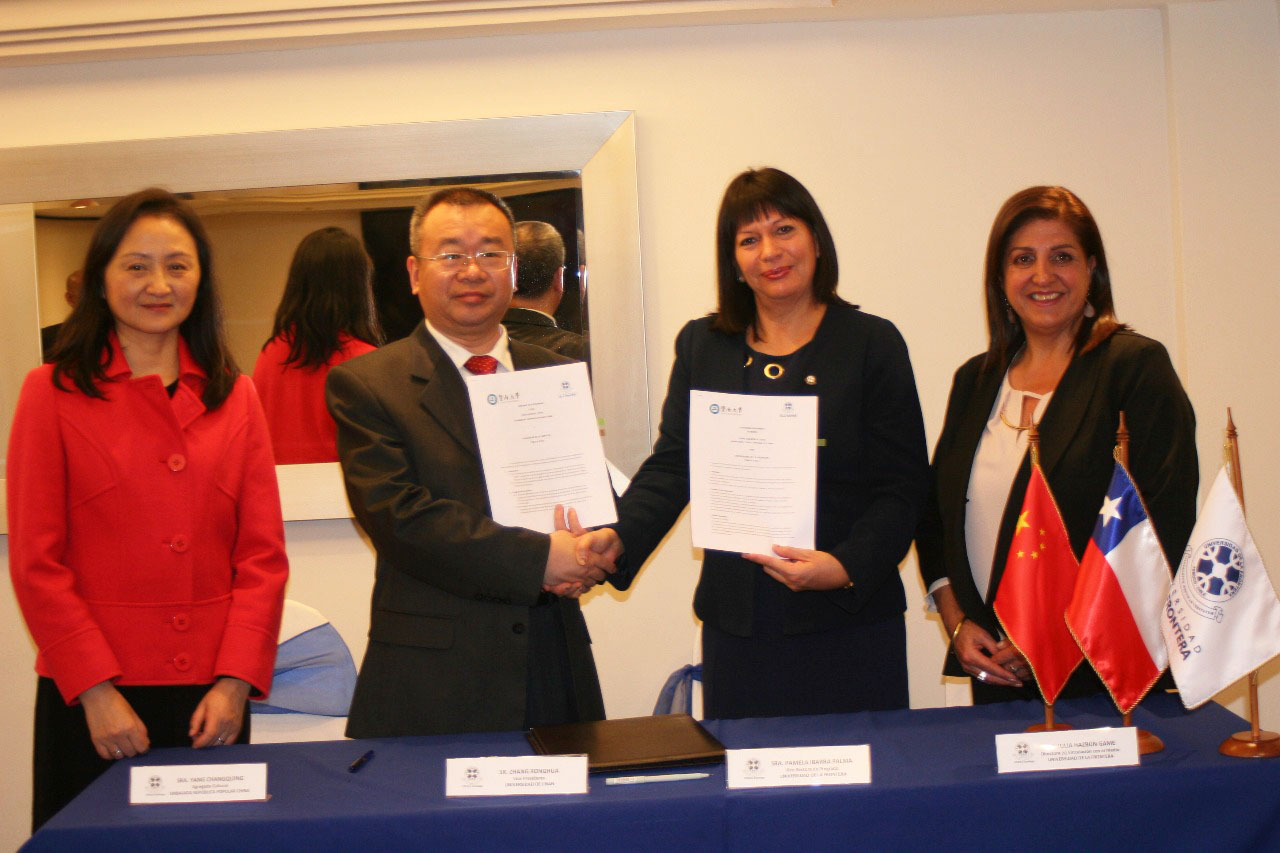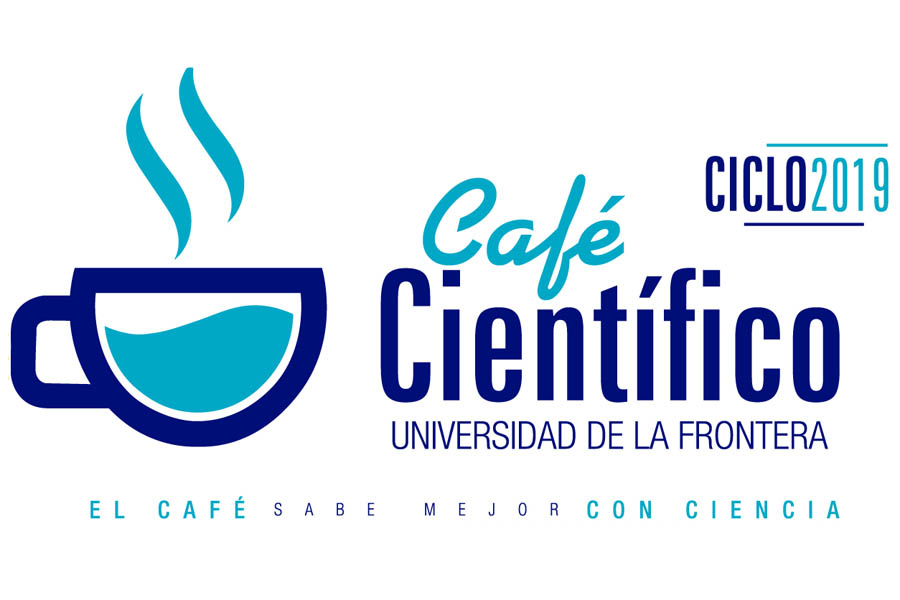|
This research project was led by Dr. Paula Aguilera and supported by the Technology Transfer Unit of the Universidad de La Frontera. They achieved to set-up a company and the licensing of an innovative agricultural technology. |
The benefits of this first inoculant biological product based on Chilean fungi (mycorrhizae), which has been developed in Temuco, Chile, by a research team of the Universidad de La Frontera, are an increase in the volume of water absorption and that it acts as an agricultural plant invigorator, amongst others. This initiative was led by Dr. Paula Aguilera, the Technology Transfer Manager at the Scientific and Technological Bioresource Nucleus (BIOREN-UFRO), together with Dr. Fernando Borie and Dr. Pablo Cornejo of the UFRO Department for Chemical Science and Natural Resources. Because of its technical features, this biological product comes with high expectations and multiple fields of use, it benefits different plant types (for agricultural and ornamental interests), and even contributes in the ecological restoration of degraded and contaminated soils. Thanks to the incorporation into the Technology based Business Scale-up Program that has been created by the Technology Transfer Unit (UTT) of the UFRO together with Incubatec-UFRO, the researchers were able to associate to form MYCONATIVA, a company that is now responsible for the biological product and that is key in the commercial management process of the product. The official launch of the company Myconativa has just been carried out at Andrés Bello Campus of the Universidad de La Frontera, where the product features and its big potential on the bio-input market in Chile have been emphasized. Dr. Paula Aguilera, who is leading Myconativa, commented: “Myconativa emerged from the university, from science and agriculture. The dynamics and evolution it had is due to the need and concerns of the society regarding the current contingencies, such as climate change, the introduction of biological products in agriculture, water deficits, and the displacement of cultivation areas. We want to be part of the solutions as a company, and that is how the project has developed its own life.” The regional director of the Chilean Production Development Corporation (CORFO), Ricardo Rojas, stated: “This company, which emerged from science and innovation, could turn into an essential factor for our regional agriculture. We have been supporting this project since the beginning, and now, it has turned into a company, within the framework of a virtuous alliance we built between the UFRO and CORFO. This is a scale-up project and that is fundamental for the wide range of possibilities this product has.” THE COMPANY The company Myconativa started as a research project, within the application to a tender for University Research Evaluation (VIU) that was supported by the UFRO Technology Transfer Unit (UTT). The Technology based Business Scale-up Program created by the UTT allowed them to license the technology and to convert it into the company Myconativa. “The support by the Office for Innovation and Technology Transfer, each one of the professionals who know exactly what they are doing, the motivation to create innovative technologies that can be applied to our agriculture and, of course, the business incubator Incubatec-UFRO – our university has great human capital that allows to support ideas, to identify financial instruments, intellectual property, and technical and financial support,” Dr. Paula Aguilera explained. Myconativa is a company for R&D. It is promoted by the university and, based on research, it develops biological products for their use in agriculture and provides services of training, consultancy and analysis. It has a bank or collection of mycorrhizae-forming fungi and prepares technology transfer activities with the municipalities of Temuco and Padre Las Casas in Chile.
 Written by: UFRO Communications Office Written by: UFRO Communications OfficeThis email address is being protected from spambots. You need JavaScript enabled to view it. |
|
The young postgraduate students from higher education institutions in Germany, Belgium, Spain and Mexico are going to stay between one and five months at the UFRO and to join different programs, faculties and institutes. |
Eight foreign students had the choice between different international institutions for higher education to carry out their short-term stays and finally chose to come to the Universidad de La Frontera in order to deepen the knowledge in their academic fields of interest and for their research. The International Affairs Office of the Universidad de La Frontera wants to provide them with the necessary support for this kind of challenge and organized a meeting for these eight young postgraduate students from Germany, Belgium, Spain and Mexico, who are going to stay at the UFRO for one to five months. “Our idea is to provide the best support possible, for the students as well as for the academics, who are constantly working on the creation of links with our foreign peers and the institutions that show interest in our university. Today, we are receiving these young postgraduate students, and tomorrow we might be working on other projects with them, their colleagues or their institutions,” commented Dr. Berta Schnettler, the director of the International Affairs Office. Among the students, who come with great expectations because they want to acquire more knowledge and new professional skills, are Estefania Soto of the Mexican Colegio del Estado de Hidalgo, who is going to spend two months at the UFRO Institute of indigenous Studies; Cristal Rosas of the Instituto Politécnico Nacional (National Polytechnic Institute) in Mexico, who is going to work at the Scientific Social Science Nucleus of the UFRO; Elena Beckers of Maastricht University in the Netherlands, who is going to stay for more than a month at the Scientific and Technological Bioresource Nucleus (BIOREN-UFRO); Ana Bucchi of the Universitat Rovira i Virgili in Belgium, who is going to join the Research Center for Dental Science of the UFRO Faculty of Dentistry; Johanna Jorkowsk of the TU Berlin in Germany, who is going to work at the UFRO Department for Chemical Engineering; Octavio Mandujano of the UAM in Mexico, who is going to join the Scientific Social Science Nucleus; and Sandra Javier and Kathia Zurita of the University of Guadalajara in Mexico, who are going to join the Department of Psychology and the Stress and Health Laboratory of the Universidad de La Frontera.
 Written by: UFRO Communications Office Written by: UFRO Communications OfficeThis email address is being protected from spambots. You need JavaScript enabled to view it. |
|
This agreement between the Universidad de La Frontera and Jinan University strengthens the academic and cultural cooperation, opens new opportunities for the students of both universities and is a new step towards internationalization |
With the aim of strengthening student and academic exchange and the artistic and cultural education of both nations, the Universidad de La Frontera and Jinan University signed a cooperation agreement that seeks to open new opportunities for the students, teachers, the university community and the Araucania Region. For Pamela Ibarra, the Vice-rector for Undergraduate Affairs at the UFRO, this agreement will allow to strengthen different fields of work of the university, as well as the exchange of students and joint research. “We want to create partnerships and expand our vision as a university, and in that context, this agreement strengthens the relation that actually already existed before with Jinan University, although, before it was oriented towards learning mandarin and now it gets strengthened and expands, opening new opportunities for exchange, commercialization and knowledge creation in a globalized world,” Ibarra explained. Zhang Ronghua, the Vice-rector of Jinan University, commented: “Our university focuses on international relations and we took notice of the UFRO because it is a young, fast-growing and solid institution. The aim of this agreement is not only to strengthen the activities that already exists – that focus on the learning of our language – but also to find new ways for the creation of knowledge, for example by joint research or by an artistic and cultural exchange, among others.” Julia Hazbun, the deputy director for Outreach and Community Engagement at the Universidad de La Frontera, added: “Apart from strengthening student mobility, this agreement seeks to strengthen the artistic and cultural exchange between both nations. This is a crucial point regarding university outreach, since all the events the university offers are for free and open to everyone.”  Written by: UFRO Communications Office Written by: UFRO Communications OfficeThis email address is being protected from spambots. You need JavaScript enabled to view it. |
|
The Science Cafe (“Café Científico”) of the Universidad de La Frontera started its fourth season on May 7, 2019. |
What started four years ago as a space for the dissemination of science and knowledge has now turned into a well-established activity of the Universidad de La Frontera that started its fourth season with interesting topics of the world of science. “This year, we are starting into a new season of this initiative that started in 2016 as a project to communicate science and that was well received by the university community and external people from the beginning. Over these years, a lot of interesting topics for the community have been presented from a scientific point of view and also turned into an opportunity of support for the community.Science plays an important social role that is not always visible and during the past three years, the Science Cafe of our university allowed thousands of people to participate in science and to be part of science, as well as for the university to show the community which is our scientific contribution,” said Dr. Alex Seguel, who is the director of the Office of Student Development at the Universidad de La Frontera and who started this initiative. Since the first session of the Science Cafe, some of the topics were natural hazards, cancer treatment, the conservation of the Araucaria, functional foods, adolescent depression, male infertility, the medical use of cannabis and much more. Over 2500 people have been participating and refuted the myth that the community is not interested in science and technology. For this year’s season, Dr. Seguel commented: “We have a high commitment with the community and that is why we want to include topics that are interesting for them, for example mental health, diversity, sexual and reproductive health, bullying and cyberbullying, physical activity and cardiovascular health, etc. Our goal is to contribute through the Science Cafe to the inclusion, well-being, and health promotion and prevention of our students and the community, within the current contexts of the university.” LIVE STREAM AND COOPERATION Each session of the Science Cafe has been and will be transmitted via live stream by UfroMedios, a media network of the Universidad de La Frontera, in order to expand the audience and to provide access to the ones who are not able to attend the sessions, that take place once a month, in person. This year, the Science Cafe counts with the support of two science-focused student groups: Sociebio and Interlab. Both groups are part of the Faculty of Agricultural and Forestry Science. FIRST SCIENCE CAFE SESSION 2019 The first session of the Science Cafe season 2019 was about “Neurodiversity: Just a trend or real?”. It was organized by BIOREN-UFRO and the UFRO Office of Student Development.
The next session of the Science Cafe will take place on July 4, 2019, and will be transmitted via live stream on: cafecientifico.ufro.cl, where you can also find the streams of some of the previous sessions.  Written by: UFRO Communications Office Written by: UFRO Communications OfficeThis email address is being protected from spambots. You need JavaScript enabled to view it. |
|
For the Universidad de La Frontera internationalization and the connection that has been established through continuous knowledge exchange between universities allowed multidisciplinary dialogues and important partnerships that led the UFRO to the academic position it has among the traditional international institutions. |
In this context, the Institute of Indigenous and Intercultural Studies (IEII) of the Universidad de La Frontera is focused on associativity and internationalization. The IEII participated at the International Symposium on Indigenous Rights and Demands in Extractivist Economies, which was part of the activities within the 30 Anniversary Celebration of the Center for Latin American Studies at the University of Pennsylvania, Philadelphia, USA, in order to connect and exchange knowledge beyond our frontiers. The activity took place on April 26th, with the participation of Natalia Caniguan, the director of the Institute of Indigenous and Intercultural Studies. She commented: “When we participate in this kind of events, the objective is to establish partnerships with foreign universities, such as the University of Pennsylvania in this case, and other institutions that are also participating in this event. It is an important step within the process of internationalization of IEII and the UFRO.” The invitation also shows that the Institute is internationally recognized because of their work regarding issues linked to indigenous peoples. This also allows us to be present in the macro debate on these topics. The representatives of the UFRO analyzed the topic “Participatory processes and the indigenous consultation in Chile”, and were accompanied by experts from Canada and Argentina, who analyzed the topic of indigenous rights at the international level. The interdisciplinary symposium was co-sponsored by the Latin America and Latino Studies Program, the Department of Africana Studies and Penny World House. The participants and experts came from different countries and addressed different topics linked to indigenous peoples.
 Written by: UFRO Institute of Indigenous and Intercultural Studies Written by: UFRO Institute of Indigenous and Intercultural Studies |





